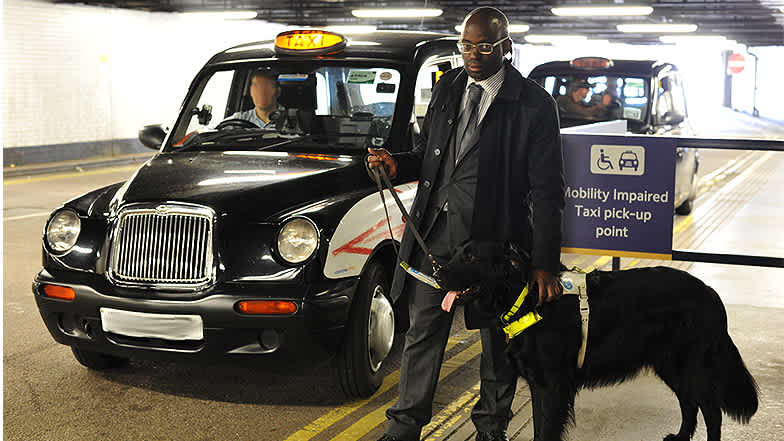Guide Dogs has worked with RNIB (Royal National Institute of Blind People) to empower guide dog owners to tackle the rising reports of cafes, hotels and taxis refusing entry to their guide dogs.
The sight loss charities have released a new toolkit to provide support and advice to guide dog owners and anyone with sight loss across the UK, informing them of their legal rights and including practical information and guides to challenge access refusals.
The new jointly-produced pack contains details of a guide dog owner’s rights under the Equality Act 2010 (England, Scotland and Wales) or the Disability Discrimination Act 1995 (Northern Ireland), a step-by-step guide to making a complaint, an example complaint letter, plus an advocacy letter from Guide Dogs and RNIB with a summary of the law and information about the service provider's obligations.
John Welsman is Guide Dogs’ Policy Business Partner for Travel and Mobility and, as a guide dog owner, has experienced access refusals himself. He said: “When somewhere like a shop or restaurant won’t accommodate someone with a guide dog, that’s not only potentially illegal but it can also be a huge blow to that person’s confidence, feelings of acceptance in society and willingness to go out with their guide dog independently.
"We work hard at Guide Dogs to give people independence and confidence by partnering them with a guide dog. If an individual is then stopped from accessing services with their dog, this is then limiting them from using their highly trained dog when it matters most.

This toolkit has been designed to give guide dog owners clear guidance and tools on what they can do if they've been treated unfairly. We also hope it'll be useful for spelling out the law to service providers, making society and access to services far more equitable.

David Clarke, Director of Services at RNIB, said: “Our legal rights team works tirelessly alongside many members of the blind and partially sighted community to challenge discrimination – including illegal guide dog refusals to public places, which I have experienced myself. With the number of access refusals for guide dog owners increasing, it is vital that people are aware of the law and have the tools they need to tackle illegal practice themselves.
“By working with Guide Dogs, we hope that the expertise of our legal rights team will inform and empower even more guide dog owners to know their rights, recognise unfair practice and challenge discrimination should they encounter it.
“With many of these incidents being down to a lack of understanding or poor staff training, we hope that this new toolkit will help lead a step-change in how people treat guide dog owners and help prevent illegal and upsetting access refusals.”
Guide dog owners can get the toolkit from their local Guide Dogs team, or from RNIB on 0303 123 9999


